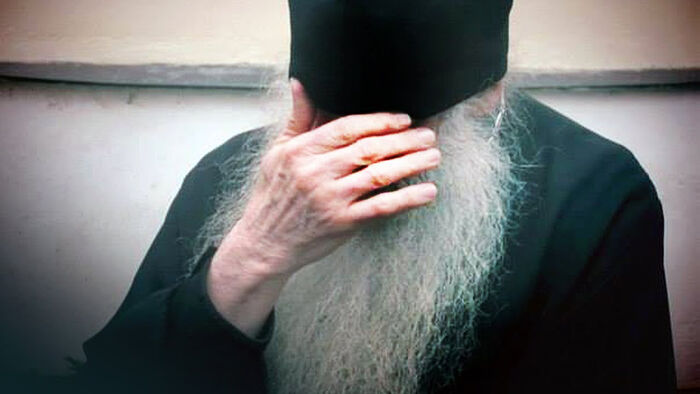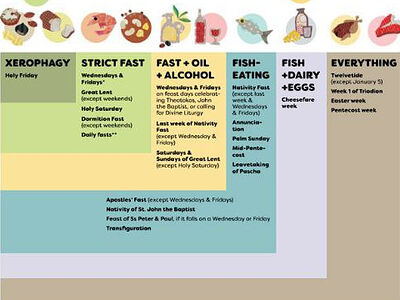Part 1: Let us Fast in Earnest
Part 2: The Meaning and Significance of Fasting
Part 3: Accustoming Ourselves to Fasting
What is spiritual fasting?
Spiritual fasting is closely connected with bodily fasting, similar to how our soul is connected with the body, penetrates it, animates it, and together with it makes up one whole as the soul and body make up one living person. And therefore, while fasting bodily, it’s necessary for us to fast spiritually as well: “While fasting with the body, brethren, let us also fast in spirit. Let us loose every bond of iniquity,”1 the holy Church commands. How can we keep this spiritual fast?
In bodily fasting, abstinence from abundant, delicious, and sweet food is at the forefront; in spiritual fasting, it’s abstinence from passionate sinful movements that delight our sensual inclinations and vices. Here giving up more substantive non-fasting food in favor of less filling fasting food; there giving up our favorite sins and transgressions and practicing the opposing virtues. Spiritual fasting means fasting with all the powers and capabilities of our soul, as well as all the members of our body.
Let the mind fast, not permitting empty and bad thoughts; let the heart fast, refraining from sinful feelings; let our will fast, directing all our desires and intentions to the one thing needful; let the tongue fast from shameful speech and slander; for what good is it if we abstain from poultry and fish, yet gnaw and devour our brethren with our evil tongue? “Whoever slanders, devours the flesh of his brother, gnaws the flesh of his neighbor,” says St. John Chrysostom. Let our eyes fast, learning not to run after beautiful faces, not gaze at someone else’s beauty; for the food of the eyes is contemplation. It harms fasting and subverts the salvation of the entire soul if it’s lawless and not permitted, but it also adorns the fast if it’s lawful and sinless.
It would be very foolish to abstain with the mouth through fasting from foods and even from permitted food, while allowing the eyes even what is not permitted. You’re not eating meat—don’t consume sensuality with your eyes (Chrysostom). Let your ears fast, not heeding any gossip or slander: Thou shalt not receive a vain report, Scripture says (Ex. 23:1). Let the hands also fast, purifying themselves from stealing that which belongs to another, and acquisitiveness; and let the feet fast, ceasing to run to disreputable spectacles and soul-damaging festivities, to seductive and shameful dances. “You’re fasting,” says St. John Chrysostom, “let it be expressed by your very deeds. What deeds, you may ask. If you see a poor man, give him alms; if you see an enemy, make peace with him; if you see a friend doing praiseworthy deeds, don’t envy him; if you see a beautiful woman, pass by.”
In brief, the essence of fasting is expressed in the following Church hymn:
If thou dost fast from food, O my soul, yet dost not cleanse thyself from passions, in vain dost thou rejoice over thine abstinence. For if thou seekest not amendment, as a liar thou art hateful in God’s sight, resembling the wicked spirits, who eat not at all. Render not the fast worthless by sinning, but firmly resist all wicked impulses. Picture to thyself that thou art standing beside the crucified Savior, or rather, that thou art thyself crucified with Him Who was crucified for thee; and cry out to Him: Remember me, O Lord, when Thou comest in Thy Kingdom.2
This is true fasting!
If, beloveds, we try to combine spiritual fasting with bodily fasting, then our fast will be “true and acceptable.”3 And if we carry out such a fast in practice, then we will grow a strong and healthy wing of fasting. But you can’t fly with one wing—you need to take heed of the other, prayerful wing.
Amen.







